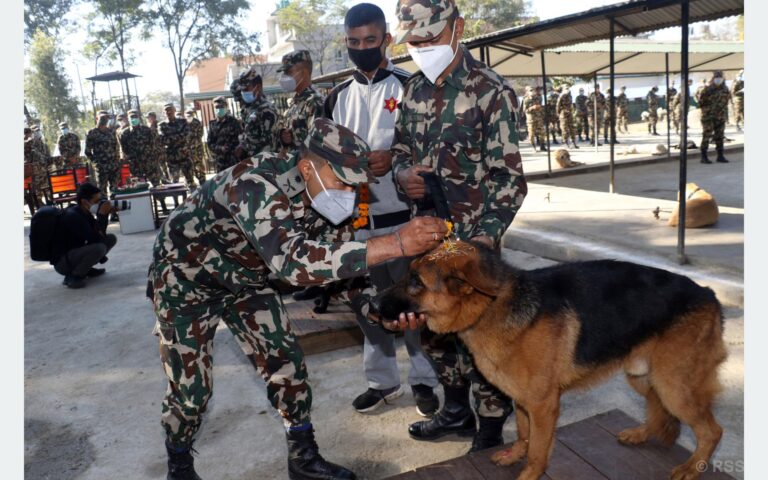
Today is Kukur Tihar, a part of the five-day Tihar festival, the second biggest festival of the Nepali Hindus. Kukur Tihar is a festival dedicated to the dog.
Kukur in Nepali language means the dog. It is the day on which the dog is worshipped and fed delicacies.
The dog is worshipped on the second day of the five-day period also known as Yamapanchaka.
As per the Hindu mythology, the dog is the vehicle of God Bhairava, who is a form of Lord Shiva or Mahadeva.
The Mahabharata, one of the religious scriptures of the Hindus, has a story which says the dog had also accompanied the five Pandava brothers, the protagonists of the Mahabharata epic, to heaven.
Mythology apart, the dog has been man’s loyal friend since the age when humans were hunters-gatherers. Even today, people in the rural parts of the country take the Bhote Kukur (an indigenous breed of hunting dog) in their hunting trips in the forest.
Since then, the dog has been together with humans. No wonder then, humans also sent a dog to space. The Russians sent a dog named Laika to space, thus giving man’s this canine friend the sobriquet of becoming the first animal to travel to space and to orbit the Earth.
A mixed-breed female dog, Laika, was launched on the then Soviet Union’s Sputnik 2 mission on November 3, 1957.
Dog, a part of Nepali Army’s peacekeeping mission
The Nepali Army has been including trained dogs in its peace-keeping missions abroad for the last 18 years.
They are used for crime investigation and security. The Nepali Army’s peace keeping forces have been using dogs to find out arms and ammunition, and explosives in the conflict zones they are working in.
It is not only the Nepali Army that has been employing dogs for security purpose. Nepal Police has been using dogs in crime investigation for many years now. It has been 18 years since the Nepali Army has started taking dogs in its peace keeping missions abroad.
The Nepali Army’s peacekeeping forces stationed in Liberia at the call of the United Nations had for the first time employed two dogs, one named as ‘Shaan’ and another called ‘Gamini’, in 2059 BS.
So far, 13 dogs have been taken for supporting the Nepali peacekeeping forces mobilised in Liberia and Libya. The Army mobilized the dogs in Libya after excellent results were achieved in tracking arms and ammunition, and explosives by employing dogs in the Liberia mission.
Dogs named Rex, Kilo, Bujo and Tony have been stationed together with the Nepali peacekeeping forces in Libya. The dogs are being used especially for finding out firearms and explosives, search and rescue, and for guarding the mission camps.
Dog also in quarantine
A dog called ‘Kilo’ has been dispatched to Libya recently on October 30 while another dog named ‘Michael’, which returned from peacekeeping mission from there, has been kept in the Army’s quarantine after its arrival home.
The government had decided to incorporate trained dogs to help the Army in 2055 BS. The same year, the Army brought six German shepherd and six Labrador breed of dogs from India for training. The dogs were trained in the following year.
There are 23 German Shepherd, 54 Labrador, five Cocker Spaniel and three pups of Malinois breed dogs at the kennel maintained at Nepali Army’s the Bhairava Vahan Company at Gaththaghar in Bhaktapur, Company Commander Sanjeev Singh Sijapati said.
Dogs have an incredible smelling power and can sense smell up to three kilometres far. They can recall the smell for up to one hour.
The cost for maintaining a dog, including training and providing for food, is Rs 373 per day. Sijapati said a pair of dogs mobilized for security and patrol in the peacekeeping mission gets an allowance of 890 US Dollars per month while a pair of dogs mobilized for search and rescue is provided 995 USD per month.
Source : RSS, Photo : RSS,






